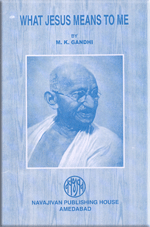
P.O. SEVAGRAM, DIST.WARDHA 442102, MS, INDIA. Phone: 91-7152-284753
FOUNDED BY MAHATMA GANDHI IN 1936
What Jesus means to Me

WHAT JESUS MEANS TO ME
Written by :
M. K. Gandhi
Compiled by :
R. K. Prabhu
Table of Contents
- My early studies in Christianity
- The Sermon on The Mount
- Why I am Not A Convert To Christianity
- Only Begotten Son of God?
- What Jesus Means To Me
- The Message of Jesus
- The Jesus I Love
- Christ - A Prince Amongst Satyagrahis
- The Greatest Economist of His Time
- Proselytization
- For Missionaries in India
- For Christian Indians
- For Christian Friends
- Value of Scriptural Texts
- Western Christianity Today
- To The Ceylonese Youth
- Some Questions And Answers
- Appendix I : Sermon on The Mount
- Appendix II : Two Favorite Christian Hymns of Gandhiji
About This Book
Written by :M. K. Gandhi
Compiled by :R. K. Prabhu
First Edition : 10,000 copies, September 1959
I.S.B.N :81-7229-387-9
Printed and Published by : Jitendra T. Desai,
Navajivan Mudranalaya,
Ahmedabad - 380 014,
India.
© Navajivan Trust, 1959
Download
Chapter-10: Proselytization
I hold that proselytizing under the cloak of humanitarian work is, to say the least,
unhealthy. It is most certainly resented by the people here. Religion after all
is a deeply personal matter, it touches the heart. Why should I change my
religion because a doctor who professes Christianity as his religion has cured
me of some disease or why should the doctor expect or suggest such a change
whilst I am under his influence? Is not medical relief its own reward and
satisfaction? Or why should I whilst I am in a missionary educational
institution have Christian teaching thrust upon me? In my opinion these
practices are not uplifting and give rise to suspicion if not even secret
hostility. The methods of conversion must be like Caesar's wife above suspicion.
Faith is not imparted like secular subjects. It is given through the language of
the heart. If a man has a living faith in him, it spreads its aroma like the
rose its scent. Because of its invisibility, the extent of its influence is far
wider than that of the visible beauty of the colour of the petals.
I am, then, not against conversion. But I am against the modern methods of it.
Conversion nowadays has become a matter of business, like any other. I remember
having read a missionary report saying how much it cost per head to convert and
then presenting a budget for 'the next harvest'.
Yes, I do maintain that India's great faiths are all-sufficing for her. Apart from
Christianity and Judaism, Hinduism and its offshoots, Islam and Zoroastrianism
are living faiths. No one faith is perfect. All faiths are equally dear to their
respective votaries. What is wanted, therefore, is a living friendly contact
among the followers of the great religions of the world and not a clash among
them in the fruitless attempt on the part of each community to show the
superiority of its faith over the rest. Through such friendly contact it will be
possible for us all to rid our respective faiths of shortcomings and
excrescences.
It follows from what I have said above that India is in no need of conversion of
the kind I have in mind. Conversion in the sense of self-purification,
self-realization is the crying need of the times. That, however, is not what is
ever meant by proselytizing. To those who would convert India, might it not be
said, "Physician, heal thyself"?
Young India,
23-4-1931